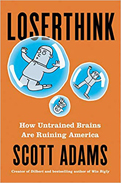
 |
Loserthink: How Untrained Brains Are Ruining America
by Scott Adams
Portfolio
Famed Dilbert cartoonist and public commentator, Scott Adams, wants to bust us from our mental prisons. We find ourselves trapped inside dead end thinking from time to time, some more often than others. He calls this “looserthink.” It’s essentially a flawed way of thinking—either through ignorance or bias—that blocks our success and even worse detracts from societal progress overall. The worst state of existing within mental bars, which occurs more often than we care to admit, is being unaware of its existence within ourselves. To escape, Adams says, it’s all a matter of training.
The book begins with a little background on the author’s own failures and eventual successes and then launches into various ways to literally think. This includes thinking like a psychologist, historian, artist, engineer, leader, scientist, entrepreneur, and economist. Separate chapters are devoted to each, and while they are insightful, it’s the economist chapter that lands most poignantly, given Adams' past training and experience in business.
If you don’t recognized yourself in a dead-ended thought pattern—at least a tendency toward a few—he reminds us throughout the book that you are probably locked inside a mental prison of your own design. For example, “If you are arguing over the definition of a word rather than the best way forward, then you are not part of the productive world.” We see this repeated in the public discourse, if you can call the room full of mostly shouting and not listening souls connected to social media a true debate. Adams does however acknowledge the Internet trolls for their help in the creation of this book. He has tangled with enough of them and indeed has become famous for his powers of persuasion demonstrated regularly on-line.
The book ends with helpful advice for breaking free of loserthink. Adams wields a kindly and concise delivery—the kind of teacher you most appreciate—when he could easily castigate the loserthinkers and close off the people who most need these lessons. We all need these lessons at some point. In the end, he believes that advancements in society have led us to the dawn of a new Golden Age, and we all need to pull together and add to the whole of a new greatness. Ditching the loserthink will unlock our minds to this possibility.
RECOMMENDED by the US Review
Next Focus Review
Previous Focus Review